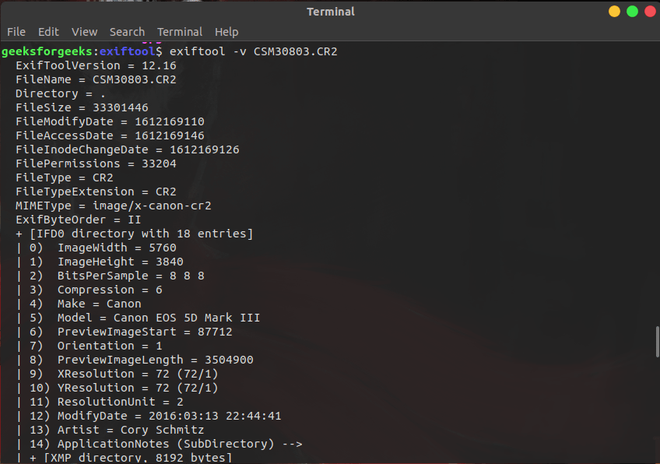

- #Exiftool examples how to#
- #Exiftool examples software#
- #Exiftool examples zip#
- #Exiftool examples mac#
# the Geotag feature writes these additional GPS tags if available: # specify where the tag is written (default is ExifIFD if not specified): # All EXIF tags are added to the Main table, and WriteGroup is used to

EXIF stands for Exchangeable Image File Format, and it is mainly used for including metadata in various file types like txt, png, jpeg, pdf, HTML and many more. It is one of a kind open-source tool which works on a variety of file types. # The %Image::ExifTool::UserDefined hash defines new tags to be added EXIF tool is a widely used meta-data information recorder built on Perl by Phil Harvey. # NOTE: All tag names used in the following tables are case sensitive. %Image::ExifTool::UserDefined::Shortcuts = ( # of tags, or to provide an alias for a tag name. # Shortcut tags are used when extracting information to simplify

# tag information hashes, see lib/Image/ExifTool/README. # For detailed information on the definition of tag tables and # a number of Shortcut and Composite tags: # This example file defines the following 16 new tags as well as # this must be the first option on the command line): # may be used to load a specific configuration file (note that

# Alternatively, the -config option of the exiftool application # defined of the following environment variables: Your home directory is determined by the first
#Exiftool examples software#
# on the Mac.) This causes ExifTool to automatically load the ExifTool is a free and open-source software program for reading, writing, and manipulating image, audio, and video metadata. Use the "rename" command in Windows or "mv" # via the command line since the GUI's may not allow filenames to The -d switch tells ExifTool to format dates according to the next arguments pattern. It has a steep learning curve, but once youre over it, the kind of renaming youre after is a snap: exiftool -d Ymd-HM-03.c.e -filename (On Mac and some Windows systems this must be done ExifTool is pretty much the Swiss army chainsaw for doing these kinds of things. # place it in your home directory or the exiftool application # To activate this file, rename it to ".ExifTool_config" and # that it is possible to override an existing tag definition # defined, but tags must be defined to be written. # Note that unknown tags may be extracted even if they aren't # define new file types and default ExifTool option values. # as how to specify preferred lenses for the LensID tag, and # add new EXIF, IPTC, XMP, PNG, MIE and Composite tags, as well # Notes: This example file shows how to define your own shortcuts and # Description: Example user configuration file for Image::ExifTool Option 2: This example contains switches specific to local practices. One using the native ExifTool accessible via the. Option 1: Provides ALL tags for files within subfolders. It is therefore a very powerful tool, the usefulness of which goes well beyond the scope of this tutorial. (Link to list) ExifTool allows you to edit all tags and even add custom tags. From here you can copy a tag and paste it into a method of choice.Īt the time of writing ExifTool supports the following file formats: 3FRģrd #- The current version of ExifTool recognizes 24,286 structure tags. Tag values can get investigated by selecting a file and clicking the ExifTool button in the Fileinfo box. ExifTool supports both more formats and more tags which can be used to mass rename files through Advanced Renamer. ExifTool is a program by Phil Harvey ( ) distributed with Advanced Renamer to create support for more file formats like raw camera files, documents, zip files etc. ExifTool Export Tag List Conclusion ExifTool A Meta-Data Reader And Writer for Linux ExifTool is one such free and open-source command line-based application that not just allows you to read meta-data information but also write and manipulate a variety of file types like TXT, PNG, JPEG, PDF, HTML, XMP, and many more.#Exiftool examples mac#
#Exiftool examples how to#
#Exiftool examples zip#


 0 kommentar(er)
0 kommentar(er)
